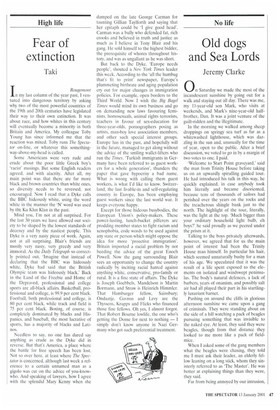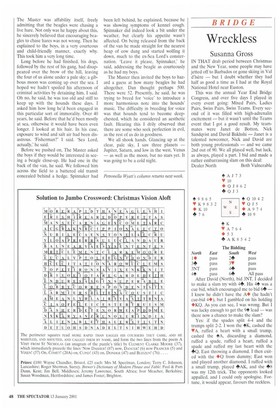No life
Old dogs and Sea Lords
Jeremy Clarke
0 n Saturday we made the most of the incandescent sunshine by going out for a walk and staying out all day. There was me, my 11-year-old son Mark, who visits at weekends, and Mark's nine-year-old halfbrother, Dan. It was a joint venture of the guilt-ridden and the illegitimate.
In the morning we walked among sheep droppings on springy sea turf as far as a whitewashed lighthouse, which was dazzling in the sun and, unusually for the time of year, open to the public. After a brief discussion, we voted to go in by a margin of two votes to one. I paid.
'Welcome to Start Point graveyard,' said the man from Trinity House before taking us on an upwardly spiralling guided tour. He had introduced his talk in this way, he quickly explained, in case anybody took him literally and became disoriented, because tens of thousands of sailors had perished over the years on the rocks and the treacherous shingle bank just to the north. The highlight of the tour, literally, was the light at the top. 'Much bigger than your ordinary household light bulb, eh boys?' he said proudly as we peered under the prism at it.
Talking to the boys privately afterwards, however, we agreed that for us the main point of interest had been the Trinity House man himself. In particular his hair, which seemed unnaturally bushy for a man of his age. We speculated that it was the result of a life spent exposed to the elements on isolated and windswept peninsulas. The body's natural defences, a lack of barbers, years of onanism, and possibly salt air had all played their part in his startlingly luxuriant harnet.
Pushing on around the cliffs in glorious afternoon sunshine we came upon a gang of criminals. They were standing about on the side of a hill watching a pack of beagles pursuing something that was invisible to the naked eye. At least, they said they were beagles, though from that distance they looked to me more like a pack of fieldmice.
When I asked some of the gang members what the beagles were chasing, they told me I must ask their leader, an elderly fellow leaning on a long stick, whom they sinisterly referred to as 'The Master'. He was better at explaining things than they were, they said.
Far from being annoyed by our intrusion, The Master was affability itself, freely admitting that the beagles were chasing a live hare. Not only was he happy about this, he sincerely believed that encouraging beagles to chase hares was not wrong. Then he explained to the boys, in a very courteous and child-friendly manner, exactly why. This took him a very long time.
Long before he had finished, his dogs, followed by the rest of his gang, had disappeared over the brow of the hill, leaving the four of us alone under a pale sky: a gibbous moon was coming up over the sea. I hoped we hadn't spoiled his afternoon of criminal activities by detaining him, I said. Oh no, he said, he was too old and stiff to keep up with the hounds these days. I asked him how long he'd been engaged in this particular sort of immorality. Over 40 years, he said. Before that he'd been mostly at sea, otherwise it would have been even longer. I looked at his hair. In his case, exposure to wind and salt air had been disastrous. 'Fisherman?' I said. 'Sea Lord, actually,' he said.
Before we pushed on, The Master asked the boys if they would be interested in seeing a beagle close-up. He had one in the back of the van, he said. We followed him across the field to a battered old transit concealed behind a hedge. Spinnaker had been left behind, he explained, because he was showing symptoms of kennel cough. Spinnaker did indeed look a bit under the weather, but clearly his appetite wasn't affected. On being released from the back of the van he made straight for the nearest heap of cow dung and started wolfing it down, much to the ex-Sea Lord's consternation. 'Leave it please, Spinnaker,' he said, addressing the beagle as courteously as he had my boys.
The Master then invited the boys to hazard a guess at how many beagles he had altogether. Dan thought perhaps 500. There were 52. Presently, he said, he was trying to breed for 'voice' to introduce a more harmonious note into the hounds' music. The difficulty in breeding for voice was that hounds tend to become deepchested, which he considered an aesthetic fault. Hearing this I drily observed that there are some who seek perfection in evil, as the rest of us do in goodness.
We all shook hands. Glancing up at the clear, pale sky, I saw three planets — Jupiter, Saturn, and low in the west, Venus — as well as the moon. but no stars yet. It was going to he a cold night.
PetroneIla Wyatt's column returns next week.































































 Previous page
Previous page